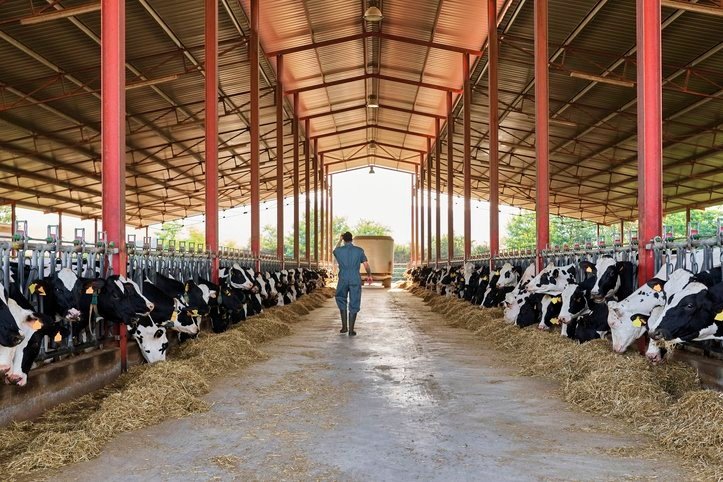
EMPOWERING FARMERS
WITH PROFITABLE, PLANET-SMART TECHNOLOGIES
Grow consistent highly nutritious animal feed using significantly less water and land while also reducing carbon emissions.
AUTOMATED ON-FARM
FEED MILLS
Forever Feed Technologies is a pioneering leader in automated on-farm feed mills that grow highly nutritious fresh cattle feed year-round.
EMPOWERING
FARMERS
Forever Feed Technologies empowers farmers with profitable, dependable, and dynamic technologies to grow their businesses amidst constantly changing markets and environments.
FOUNDED BY
FARMERS
Forever Feed Technologies was founded and funded by farmers looking to build a profitable, dependable, and dynamic future for them and their families.
PROFITABLE
Return on Investment
Forever Feed Technologies gives large scale dairy and cattle operations the ability to greatly reduce the money they spend on water, land, labor, fertilizer, and fuel used to feed their animals.
The FFT Feed Mill produces consistent energy efficient sprouted grain feed, yielding better production and a compelling return on investment for farmers and their families.
DEPENDABLE
Industrial Scale Automation Equipment
The Forever Feed Mill uses industrial scale automation equipment, which has been in service for decades around the world. This ensures that the FFT Feed Mill will be operational and dependable every day, every month…for years.
The FFT Feed Mill gives major dairy and beef operations the confidence they need to meet growing demands for the foods they produce.
DYNAMIC
FFT Feed Mill Machine Learning
The Forever Feed Mill operating system includes a pathway for machine learning, giving it the dynamic agility to incorporate new growing protocols for different feed compositions.
Each harvest of Automated Sprouted Grain™ is monitored for dry matter weight, consistency, and sustainability metrics such as water and energy use.
PLANET-SMART
ANIMAL FEED
ON-FARM
FEED MILL
Forever Feed Technologies has partnered with JR Automation, a global automated manufacturing technology company and subsidiary of Hitachi, Ltd.
Using FFT’s patented Automated Sprouted Grain™ growing systems and protocols, JR Automation will help design and build on-farm indoor feed mills for large-scale dairy and beef cattle producers. Together we will continue to maximize feed output, water efficiencies, and carbon emission reductions.
Established in 1980, JR Automation Technologies is a leading provider of intelligent automated manufacturing technology solutions that solve customers’ key operational and productivity challenges. JR Automation serves customers across the globe in a variety of industries, including automotive, life sciences, aerospace, and more. In 2019, JR Automation was acquired by Hitachi, Ltd.
AUTOMATED
SPROUTED GRAIN™
FFT planet-smart feed mills grow Automated Sprouted Grain™, a nutritious sprouted wheat grass supplement that improves cattle health and productivity. ASG™ enriched feed also reduces “cattle belching” methane emissions by effectively changing the efficiency of the rumen.
The first enterprise-scale FFT Feed Mill will be in operation later this year at the River Ranch Dairy in Hanford, California, to enrich the diets of over 5,000 dairy cows.
Dr. Greenhouse, Inc., a leader in designing environmental control systems for indoor agriculture, will collaborate with Forever Feed to maximize the growth and nutrient value of Automated Sprouted Grain™.
FFT FEED MILL
BENEFITS
PRODUCTIVITY
INCREASE
A hydroponic forage study at Cornell University showed a small decrease in dry matter intake and an increase in efficiency to make milk when sprouted grain is added to dairy cattle’s total mixed ration.
AgProud.com, August 1, 2023
Feed Efficiency
RESOURCE
SAVINGS
WATER
Uses 95% less water
LAND
Uses 99% less land
FUEL EMISSIONS
Requires no combines, tractors, trucks, etc.
Compared to field grown alfalfa forage:
SPROUTED
GRAIN
Highly nutritious & digestible
Consistent quality
Clean…no pesticides/herbicides
ASG™ High-value Feed
IMPROVED ANIMAL
PERFORMANCE
Improved nutrient digestibility
Reduced enteric methane emissions
Improved feed conversion
On-going research into sprouted grain fodder has indicated that the sprouted grains were stimulatory to rumen fermentation.
Compared to field grown forage:
FRESH FEED
24/7/365
ENTERPRISE SCALE
Automated Feed Production
DEPENDABLE
Industry Proven Engineering and Equipment
RELIABLE OPERATIONS 24/7/365
AGRICULTURE
CHALLENGES AND RISKS
ENVIRONMENTAL
RISKS
“Shifting precipitation patterns, associated with higher temperatures, are causing more intense wildfires that reduce forage on rangelands and accelerate the depletion of water supplies for irrigation.”
Shifting Precipitation & Temperature Patterns
WATER
SHORTAGES
“The megadrought in the Western U.S., now in its second decade, is the worst since 800 A.D. and any relief is not expected until 2030, according to a study published in the scientific journal Nature, Feb. 14, 2022.”
Western U.S. Megadrought
ARABLE
LAND
“U.S. agriculture currently faces some steep challenges. Climate change and biodiversity loss represent existential threats to the agricultural status quo. Farmland has become less functional as a result of increasing stresses from drought, floods, pests, and heatwaves.”
Farmland Becoming Less Functional
FUEL
EMISSIONS
“The agricultural sector accounted for about 9% of the Nation’s total GHG emissions in 2015, so reducing emissions in the agriculture sector could have a significant impact on total U.S. emissions. Nonetheless, agriculture is one of the few sectors with the potential for significant increases in carbon sequestration to offset GHG emissions.”
AG Sector Emits 9% of U.S. Greenhouse Gasses
METHANE
EMISSIONS
Cattle Digestion Methane - 45% of AG Emissions in the U.S.
“Methane from cattle digestion (enteric emissions) and stored manure makes up roughly 45% of those agricultural emissions nationally (or 4.5% of total emissions in the US). Increases in methane emissions due to growing livestock numbers have significant climate impacts. Conversely, reductions in methane emissions from livestock could have immediate climate benefits and could be a large component of reducing greenhouse gas emissions from agriculture.”
Methane Emissions from Livestock and Climate Change, University of Wisconsin-Madison, 2020






























